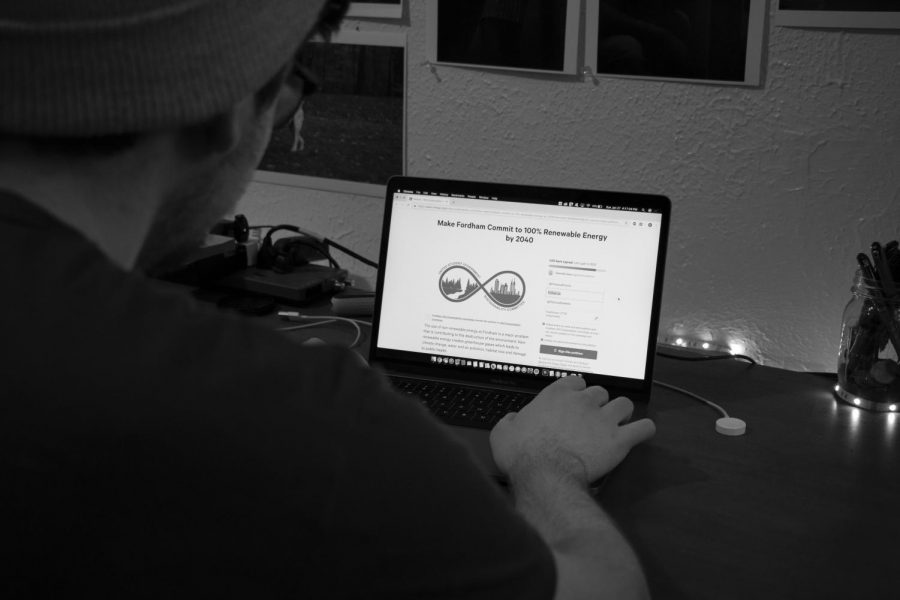USG Sustainability Committee Petitions for 100 Percent Renewable Energy
By Helen Stevenson
In a petition circulating online, the United Student Government (USG) Sustainability Committee urged the university’s administration to commit to 100 percent renewable energy by no later than 2040. As of Tuesday, Jan. 29, over 430 people have signed the petition.
The committee said the university’s current use of non-renewable energy contributes to a global environmental issue.
“The use of non-renewable energy at Fordham is a major problem that is contributing to the destruction of the environment,” the petition reads. “Non-renewable energy creates greenhouse gases, which leads to climate change, water and air pollution, habitat loss and damage to public health.”
In the petition, the committee noted that the request is in compliance with Governor Cuomo’s goal to have New York state run on renewable electricity sources by 2030. It stated that promoting and furthering Cuomo’s goal is a reflection of the university’s Jesuit mission.
“Fordham has the opportunity to reflect our Jesuit values and act as a leader of sustainability for other Jesuit universities,” the petition reads.
According to Sarah Cassidy, FCRH ’21 and member of the Sustainability Committee, there is a lack of information available from the university regarding sustainability efforts.
“Even after doing research and talking to staff, it is unclear how the university is providing energy. Fordham is not explicit when it comes to sustainable matters,” she said. “We do know that solar panels were placed on the parking garage this summer. However, this is not enough to stop climate change from occurring.”
There was, however, a Climate Action Plan published in 2014 detailing the university’s efforts to achieve 30 percent emissions by 2017. Unfortunately, that goal was not met.
Molly Gleason, FCRH ’21 and member of the Sustainability Committee, said that although creating this goal is an impressive effort, the university must work harder to meet it.
“It’s frustrating to hear [the goal was not met] because while it’s definitely a step in the right direction, it hasn’t been completed,” she said.
Currently, the university operates using solar panels installed on the roof of the parking garage and solar installation in Staten Island. However, Gleason said that the university must do more to combat climate change.
To further this effort, Cassidy said the committee partnered with Environment America (EA), an organization focused on assisting student sustainability initiatives, to work towards 100 percent sustainability. She said EA has helped the committee set goals, figure out targets and decide tactics.
“Together, we decided that a petition would allow students to directly target the Fordham administration,” she said. “One of the best methods for creating change is to expose the issue. Just reading our petition allows not only administration but other students and faculty to be more aware of climate change.”
At the USG Senate meeting this week, several representatives voiced their concerns with the petition’s rhetoric. Connor Sullivan, FCRH ’19, president of USG, said the Senate needed to ensure the document fits precedent with regards to past statements USG has released.
“We strive to be a consistent body and that means making sure we are releasing consistent, accurate and informative documents,” he said.
However, Sullivan said that there was no controversy with the content of the Sustainability Committee’s petition; rather there was input from the Senate to make sure it is released in the best form possible.
“Moving forward, the Sustainability Committee will continue to do its great work on campus to ensure that Fordham continues to become a sustainable university to better serve the community,” he said.
Cassidy said that the Sustainability Committee’s request is not only attainable, but necessary.
“Plenty of colleges across the country have already switched to renewable energy sources while other schools continue to fight for the dismissal of non-renewable energy,” said Cassidy. “Science says that we must commit to moving away from fossils fuels by 2050 in order to save the environment. At this point, switching to renewable energy is our only option.”
Gleason said that the university must act now in order to prepare for the future.
“This process of switching to renewable energy isn’t simple and cannot be done very quickly, but it’s something that needs to be done,” she said. “It is our responsibility to act against climate change.”












































































































































































































